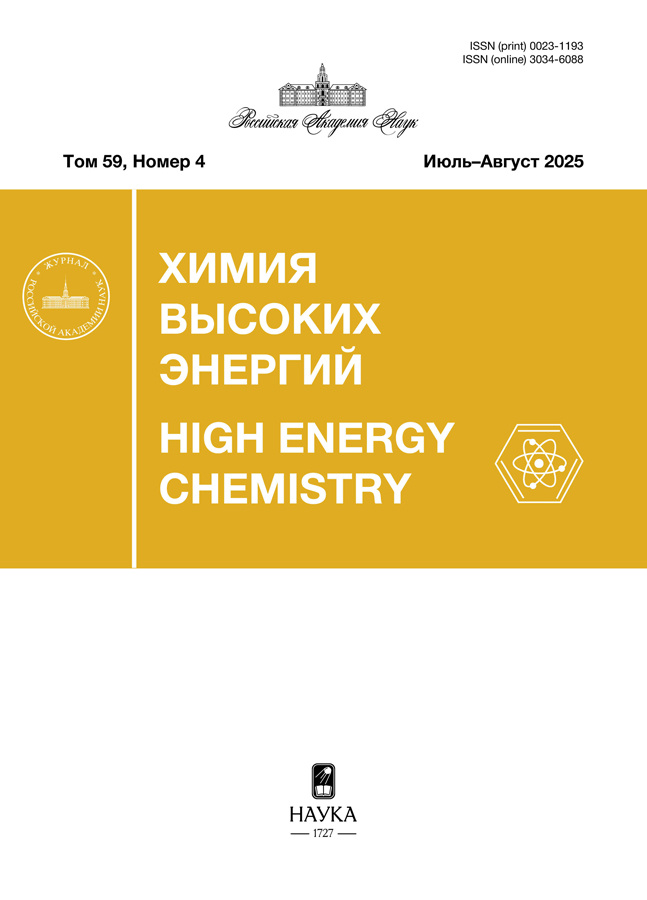EPR spectra and antioxidant activity of gamma-irradiated papain
- Authors: Tokarev S.V.1, Faingol’d I.I.1, Poletaeva D.A.1, Smolina A.V.1, Demidov S.V.1, Akimov A.V.1, Allayarova U.Y.1, Raevskaya T.A.1, Allayarov S.R.1
-
Affiliations:
- Federal Research Center for Problems of Chemical Physics and Medicinal Chemistry of the RAS
- Issue: Vol 59, No 4 (2025)
- Pages: 235–243
- Section: RADIATION CHEMISTRY
- URL: https://manmiljournal.ru/0023-1193/article/view/687707
- DOI: https://doi.org/10.31857/S0023119325040078
- EDN: https://elibrary.ru/ayavhz
- ID: 687707
Cite item
Abstract
The structure and number of paramagnetic centers (PC) stabilized in papain γ-irradiated with a dose of 50 to 2300 kGy were studied using EPR spectroscopy. The radiation yield G≈6 PC/100 eV during radiolysis at 77 K is six times greater than the PC yield in the samples irradiated at 300 K. During radiolysis at 300 K, the maximum concentration of PC is achieved at doses of 200 kGy at a level of 8 × 1018 PC/g, whereas in papain radiolyzed at 77 K they accumulate up to 2300 kGy and reach 2.2 × 1020 PC/g. During papain radiolysis at 77 K, the cleavage of the peptide bond prevails over the cleavage of bonds in the molecular groups of amino acid residues, including sulfur-containing ones. As a result, radicals are mainly recorded in the EPR spectra. In the multicomponent spectrum of papain irradiated at 300 K, a doublet with splittings of 1.77 mT is distinguished, attributed to the radical formed by the abstraction of hydrogen from the glycine residue. Peroxide radicals formed during radiation oxidation at 300 K are not retained in the matrix of irradiated papain as stabilized radicals and, most likely, participate in secondary radiation-chemical processes with the formation of oxygen-containing products. A tendency for the antiradical and antioxidant activity of papain to increase with increasing radiation dose is noted as a result of radiation destruction of the peptide bond with the formation of amino acid fragments that are donors of a hydrogen atom.
Keywords
Full Text
About the authors
S. V. Tokarev
Federal Research Center for Problems of Chemical Physics and Medicinal Chemistry of the RAS
Email: sadush@icp.ac.ru
Russian Federation, Chernogolovka
I. I. Faingol’d
Federal Research Center for Problems of Chemical Physics and Medicinal Chemistry of the RAS
Email: sadush@icp.ac.ru
Russian Federation, Chernogolovka
D. A. Poletaeva
Federal Research Center for Problems of Chemical Physics and Medicinal Chemistry of the RAS
Email: sadush@icp.ac.ru
Russian Federation, Chernogolovka
A. V. Smolina
Federal Research Center for Problems of Chemical Physics and Medicinal Chemistry of the RAS
Email: sadush@icp.ac.ru
Russian Federation, Chernogolovka
S. V. Demidov
Federal Research Center for Problems of Chemical Physics and Medicinal Chemistry of the RAS
Email: sadush@icp.ac.ru
Russian Federation, Chernogolovka
A. V. Akimov
Federal Research Center for Problems of Chemical Physics and Medicinal Chemistry of the RAS
Email: sadush@icp.ac.ru
Russian Federation, Chernogolovka
U. Yu. Allayarova
Federal Research Center for Problems of Chemical Physics and Medicinal Chemistry of the RAS
Email: sadush@icp.ac.ru
Russian Federation, Chernogolovka
T. A. Raevskaya
Federal Research Center for Problems of Chemical Physics and Medicinal Chemistry of the RAS
Email: sadush@icp.ac.ru
Russian Federation, Chernogolovka
S. R. Allayarov
Federal Research Center for Problems of Chemical Physics and Medicinal Chemistry of the RAS
Author for correspondence.
Email: sadush@icp.ac.ru
Russian Federation, Chernogolovka
References
- Amri E., Mamboya F. // Am. J. Biochem. Biotechnol. 2012, V. 8. P. 99.
- Kamphuis I., Kalk K., Swarte M., Drenth J.J. // Mol. Biol. 1984. V. 179. P. 233.
- O´Neil M.J. The Merck index: an encyclopedia of chemicals, drugs, and biologicals, 13th Edition, Whitehouse Station, NJ: Merck, 2001.
- https://web.archive.org/web/20140715224627/http://www.biozym.de/datasheets/papain.php
- Menard R., Khouri H.E., Plouffe C., Dupras R., Ripoll D. // Biochemistry. 1990. V. 29. P. 6706.
- Tsuge H., Nishimura T., Tada Y., Asao T., Turk D. // Journal of Biochemicaland Biophysical Research Communications. 1999. V. 266. P. 411.
- Guo Z., Mcgill A., Yu L., Li J., Ramirez J., Wang P.G. // Bioorg. Med. Chem. Lett. 1996. V. 6. P. 573.
- Xian M., Chen X., Liu Z., Wang K., Wang P.G. // Journal of Biological Chemistry. 2000. V. 275. P. 20467.
- Varca G.H.C., Kadlubowski S., Wolszczak M., Lugão A.B., Rosiak J.M., Ulanski P. // Journal of Biolog. Macromolecules. 2016. V. 92. P. 654.
- Аллаяров С.Р., Руднева Т.Н., Демидов С.В., Аллаярова У.Ю., Чекалина С.Д. // Химия высоких энергий. 2024. Т. 58. № 5. С. 397.
- Аллаярова У.Ю., Демидов С.В., Блохина С.В., Раевская Т.А., Мищенко Д.В., Омельчук Ю.А., Аллаяров С.Р. // Химия высоких энергий. 2024. Т. 58. № 5. С. 404.
- Varca G.H.C., Ferraz C.C.F., Lopes P.S., Mathor M.B., Grasselli M., Lugão A.B. // Radiation Physics and Chemistry. 2014. V. 94. P. 181.
- Kedare S.B., Singh R.P. // J Food Sci Technol. 2011. V. 48. P. 412.
- Ohkawa N. Ohishi K., Yagi K. // Anal. Biochem. 1979. V. 95. P. 351.
- Шарпатый В.А. Радиационная химия биополимеров. М.: Энергоиздат, 1981. С.72.
- Sevilla M.D., D’Arcy J.B., Morehouse K.M. // J. Phys. Chem. 1979. V.83. P. 2893.
- Пшежецкий С.Я., Котов А.Г., Милинчук В.К., Рогинский В.А., Тупиков В.И. ЭПР свободных радикалов в радиационной химии ЭПР свободных радикалов в радиационной химии. М.: Химия, 1972. С. 309.
- Усатый А.Ф., Лазуркин Ю.С. Элементарные процессы химии высоких энергий. М.: Наука, 1965. С. 209.
- Garrison W.M., Jayko M.E., Rodgers A.J., Sokol H.A., Bennett-Corniea W. Washington, DC: The National Academies Press, 1968. P. 384.
- Кузина С.И., Аллаяров С.Р. // Химия высоких энергий. 2023. Т. 57. С. 384.
- Snipes W., Horan P.K. // Radiat. Res. 1967. V. 30. P. 307.
- Henriksen T. Electron spin resonance and effects of radiation on biological systems. Washington, DC: The National Academies Press, 1966. Р. 81.
- Каюшин Л.П., Львов К.М., Пулатова М.К. Исследование парамагнитных центров облученных белков, М.: Наука, 1970. С. 174.
- Милинчук В.К., Клиншпонт Э.Р., Пшежецкий С.Я. Макрорадикалы. М.: Химия, 1980. 264 с.
Supplementary files























